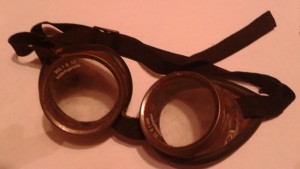 Shortly after joining IBM, I sent an inquiry to an IBMer. I received a timely response from her and noticed in the e-mail signature was the title “Master Inventor“. This was the first time I had heard the term and it evoked images of a job where one wears a lab coat and perchance even goggles. I thanked the sender for the information and mentioned that I thought Master Inventor was a cool title. She then gave a brief response explaining the Master Inventor title and how she got there and how I could get started on the patenting path. I do not remember who it was, but I am grateful that she took the time to provide a nice, personal response. That is what started me down the road of turning ideas into inventions in a formal way.
Shortly after joining IBM, I sent an inquiry to an IBMer. I received a timely response from her and noticed in the e-mail signature was the title “Master Inventor“. This was the first time I had heard the term and it evoked images of a job where one wears a lab coat and perchance even goggles. I thanked the sender for the information and mentioned that I thought Master Inventor was a cool title. She then gave a brief response explaining the Master Inventor title and how she got there and how I could get started on the patenting path. I do not remember who it was, but I am grateful that she took the time to provide a nice, personal response. That is what started me down the road of turning ideas into inventions in a formal way.
About eight years later, I was honored to be named an IBM Master Inventor. While I didn’t receive a monogrammed lab coat or goggles (sob), I did receive a nicely framed certificate that now hangs above my disheveled desk. Less obvious than the cool title is the learning and experience I gained. One of the things I learned is that ideas are cheap; I mean that in different ways.
Ideas are cheap. You’ve got to work to make them valuable. I’ve “lost” some good ideas because I didn’t take effort to write them up, define things more clearly, and actually do something with the idea.
Ideas are cheap. Anyone can have them. It doesn’t cost years of study or practice to have an idea. It doesn’t take expertise. Often I’ve heard terrific ideas from people with no knowledge of the technical area and having just heard about a problem to be solved. It’s important to listen to the ideas of other people.
Ideas are cheap. In brainstorming some say there aren’t any bad ideas, but there are. The funniest of my bad ideas come when I’m half asleep and somehow I convince myself that I’ve come up with something brilliant. Fortunately, I’ve learned not to get too attached to bad ideas–I can throw them away because they are cheap.
Ideas are cheap. It’s OK to share ideas with others–it’s better than hoarding them. This is especially true for ideas that aren’t accompanied by any action–perhaps someone else will see your good idea through. In my case, my employer has first dibs on my relevant ideas (and I am compensated for them). But ideas that are unrelated to or unwanted by IBM I am free to share. So perhaps a future posting will describe the invention I built so that I could dance my password.
Ideas are cheap. So try to have a lot of ideas. I played paintball once and learned the concept of “accuracy by volume”. If you cover the arena with paint you’re likely to also get your opponents. If you have a lot of ideas, some of them are bound to be good.
Ideas are cheap, but I’ve gained a lot working with them. So now when I submit my tax return (as I recently did), under occupation I specify Master Inventor. Perhaps someone in the IRS is imagining that I wear goggles . . .